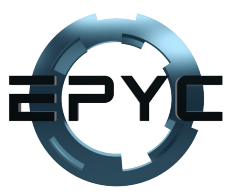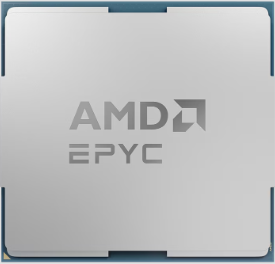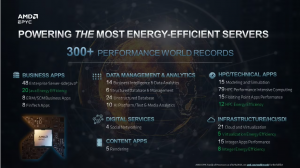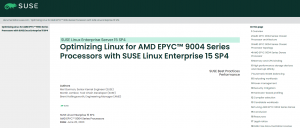New tuning guide: Optimizing Linux for AMD EPYC™ 9004 Series Processors
EPYC is AMD’s flagship mainstream server microprocessors and supports 1-way and 2-way multiprocessing. 
The first generation was originally announced back in May 2017: At time being, it replaced the previous Opteron server family with the introduction of the Zen microarchitecture for the mainstream market.
4nd Generation AMD EPYC™ Processors
With the fourth iteration of the EPYC processors, AMD has released a game-changing processor family for servers. Introduced to the market in November 2022, AMD EPYC™ 9004 Series Processors are based on the company’s Zen 4 architecture. Thanks to technology innovation, Zen 4 supports up to 128 cores (256 threads) and 12 memory channels, 50% more than the prior generation. This sets a new standard for the modern data center.

AMD EPYC 9004 Series processors demonstrate how a hybrid, multi-die architecture delivers strong innovation and delivers additional customer value with every new generation. Decoupling the core and I/O innovation processes enabled AMD to shrink the CPU die. This, in turn, makes room for more cores and provides for energy-efficient performance.
Collecting again world records
Using industry-standard consortium benchmarks and ISV workloads, AMD EPYC™ Processors to date have set more than 300 world records! These world records do not only comprise infrastructure (including hyperconverged and software-defined infrastructure), data management and analytics, but also energy efficiency, business applications, and high performance computing and technical applications,

Many of the records were achieved with SUSE Linux Enterprise Server as the operating system of choice running on the 4th Gen AMD EPYC processors.
Performance tuning guide details
If you now want to understand how to obtain world record performance for your business, we recently published a new SUSE Best Practices tuning guide that helps you to get the best out of SUSE Linux Enterprise Server running on AMD EPYC™ 9004 Series Processors. This document, written by my colleagues Mel Gorman and Martin Jambor (in close collaboration with their peers at AMD), provides an overview of how some computational-intensive workloads can be tuned on SUSE Linux Enterprise Server 15 SP4.

After introducing the architecture and topology of the AMD EPYC™ 9004 Series Processors, the guide covers all relevant topics regarding performance tuning. This includes memory and CPU binding, high-performance storage devices and interrupt affinity, automatic NUMA balancing, power management, hardware-based profiling, and some security mitigations.
What’s more, the guide features a comprehensive chapter that contains a good deal of candidate workloads, including performance test scenarios and their results.

Curious now? Read the entire tuning guide at our documentation Web page. This new paper will provide you with a myriad of useful and valuable information and insight on how to tune performance of SUSE Linux Enterprise Server 15 SP4 on AMD EPYC™ 9004 Series Processors.
By the way, on our documentation Web pages you can also find many more SUSE Best Practices documents for a variety of topics. And if you want to write / contribute to a SUSE Best Practices paper yourself, send an email to the SUSE Documentation team at doc-team@suse.com or contact me directly (meike.chabowski@suse.com). Always happy to help!
Disclaimer: The text at hand has been written by a non-native English speaker. If you find typos or language mistakes, please send them to me (meike.chabowski@suse.com) – or if you like them, just keep them and feed them. 😁
Related Articles
Jul 20th, 2022
What is a kernel thread?
Aug 19th, 2022
SUSE Linux Enterprise Micro 5.3 Public Beta (Beta 2) is out!
Oct 06th, 2022